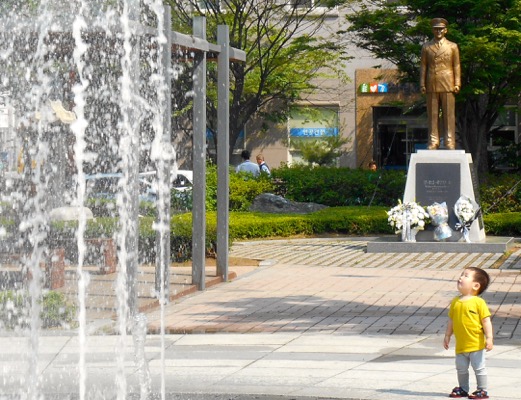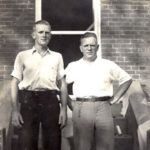Should I Stay or Should I Go?

For Bill Shaw, a 29-year-old husband, father of two, and first-year doctoral student at Harvard, the answer was clear. He told his wife, two young boys, parents, and professors he’d be back soon. His studies could wait, he explained.
Three months later, on September 22, 1950, US Navy Lt. William Hamilton Shaw, on patrol with US Marines outside of Seoul, Korea, was killed in a North Korean ambush. He had volunteered for the mission.

Bill Shaw with his father (circa 1940)
The son of Methodist missionaries, Shaw was born and raised in Pyongyang, Korea (today the capital of North Korea). He graduated from Pyongyang Foreign High School and spoke fluent Korean. After moving to the States to attend college, he joined the US Navy and served in World War II. In 1946 he returned to Korea to teach at the ROK Naval Academy.
In 1949, Shaw - now with a wife and two children - went back to the US and enrolled at Harvard. As a handsome, intelligent, and successful young man, Shaw’s future looked bright. Once he completed his degree, he planned to return to his adopted homeland as a missionary.
But within months of starting classes, the Korean War broke out. Suddenly, everything changed. “I cannot in good conscience return to Korea as a Christian missionary in peacetime if I am not first willing to be there to help the Koreans defend their freedom in time of war,” he wrote one of his friends.
I can only imagine what his wife thought about his decision. A week after the Inchon Landing and only days before Seoul’s liberation, she became a widow. Her children fatherless.
Shaw’s life, incredible courage and loyalty, and death raise many questions. Why did he feel the need to return to Korea after already having given so much to the country? Why did he decide to leave his family and friends and postpone his degree? And what made him volunteer to go with the Marines on a highly dangerous, combat patrol into enemy territory?
We may never fully understand what he was thinking, but the quotation on his memorial at Eunpyeong Peace Park in Seoul may give us the best clue:
“Greater love has no one than this, that he lay down his life for his friend.” John 15:13
In 1956, six years after her husband's death, Juanita Shaw returned to South Korea with her two sons. She stayed in Korea for twelve years as a missionary, learned Korean, and became a teacher in Seoul. Twenty-one years later, William R. Shaw, her eldest son, earned the same Harvard doctoral degree that his father never completed.

Photo Credit -William Hamilton Shaw and his father: (From UNN News - http://news.unn.net/news/articleView.html?idxno=62291); Ned Forney
Blog sources: "Who is William Hamilton Shaw?" publication- Mokwon University Methodist Church; http://www.navy.mil/submit/display.asp?story_id=83585
this is my great grandfather
Thanks for reading the blog and commenting, Jonah. It’s always great to hear from the families of our Korean War veterans!
It has been an honor to research and write about your great-grandfather, and we’d like to share his story in a publication one day so a bigger audience can learn about his amazing life of service and sacrifice.
His birthday is next week and we’re hoping to get to the cemetery to pay our respects.
Again, thank you for touching base.
Loved this short, but want to read more, explanation. Good job.
Glad you enjoyed it! There is definitely more to the story of this fascinating man and his family, and I may follow up with another post.